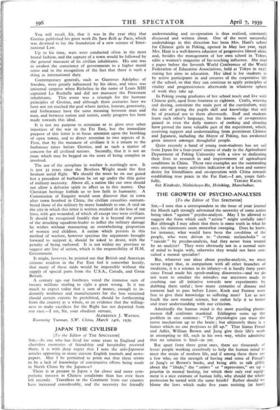JAPAN THE CIVILISER
[To the Editor of THE SPECTATOR] SIR,—AS one who has lived for some years in England and cherishes memories of friendship and hospitality received there, it is with deep regret that I note the anti-Japanese articles appearing in many current English journals and news- papers. May I be permitted to point out that there seems to be a lack of knowledge of constructive efforts being made in North China by the Japanese?
There is at present in Japan a far closer and more sym- pathetic interest in Chinese conditions than has ever been felt recently. Travellers to the Continent from our country have increased considerably, and the necessity for friendly understanding and co-operation is thus realised, constantly discussed and written about. One of the most successful undertakings in this direction has been Mrs. Hani's school for Chinese girls in Peking, opened in May last year, 1938. Mrs. Ham is a well-known educator of progressive liberal ideas, and, besides the management of her own school in Tokyo, edits a women's magazine of far-reaching influence. She read a paper. before the Seventh World Conference of the World
Federation of Education Associations, held at Tokyo in 1937, stating her aims in education. Her ideal is for students to be active participants in and creators of the corporative life of the school, so that they can continue to apply principles of vitality and progressiveness afterwards in whatever sphere of work they take up.
In Peking young graduates of her school teach and live with Chinese girls, aged from fourteen to eighteen. Crafts, weaving and dyeing, constitute the main part of the curriculum, with the aim of giving the pupils skill and knowledge that will be of practical use to them afterwards. Staff and students learn each other's language, but the lessons of co-operation gained in even the daily matters of cooking and cleaning have proved the most valuable part of the experiment, which, receiving support and understanding from prominent Chinese and Japanese, including the Mayor of Peking, has awakened great interest amongst thoughtful people.
Quite recently a band of young men-students has set sail from Japan for a four-years' course of study in the Agricultural Department of Peking University with a view to dedicating their lives to research in and improvement of agricultural conditions in China. These two examples are the outstanding ones amongst many activities indicative of a keen and earnest desire for friendliness and co-operation with China towards establishing true peace in the Far East—I am, yours faith-










































 Previous page
Previous page